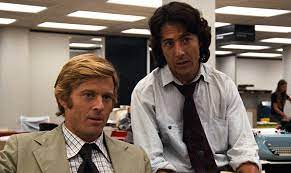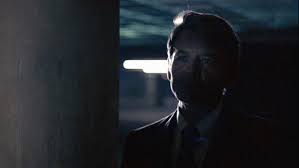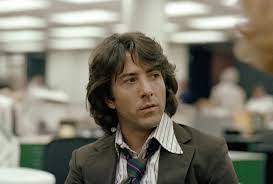"Follow the money" - Deep Throat
Grainy footage from June 1972 sees President Richard Nixon addressing the House of Representatives, Congress, and the people of the United States of America. Further grainy footage, this time from August 1974, sees the same man resigning in disgrace.
Other than that, Richard Nixon does not appear once in Alan J Pakula's 1976 film All The President's Men (recently shown on BBC1 and still available on iPlayer). He's barely even mentioned yet his malignant influence casts a long dark shadow right across a film that grows increasingly tense and paranoid as investigations into a break in at the offices of the Democratic party HQ in Washington DC, in a place you may have heard mentioned - the Watergate complex, unravel to reveal the extent of wrongdoing that has taken place under his administration.
Interestingly, it's not the police so much as journalists who perform this investigation and are, ultimately, the heroes of the day. Following the break in, carried out - noticeably - by men in suits, rookie Washington Post journalist Bob Woodward (Robert Redford) is assigned to the case.
When the thieves are revealed to have been carrying bugging equipment, when it becomes known they are being represented by a high level 'country club' lawyer, and when it emerges they all have personal links with the CIA it sets Woodward (soon joined by Carl Bernstein (Dustin Hoffman), a slightly more experienced journalist) on to a chain of discoveries that will shock America and lead the entire country into a time of sadness and paranoia.
As Woodward and Bernstein go assiduously and honestly about their work they run up against people who change their stories - often within seconds, people who deny knowing other people who they clearly know well, and are met with hostility and suspicion. Doors, quite regularly, are slammed in their face.
Why does Deep Throat (Hal Holbrook) speak in riddles and communicate using strategically positioned flags on balconies and what have CREEP (the Committe to Re-Elect the President) got to do with it all, if anything? Especially as Nixon is an overwhelming favourite to trounce the Democratic candidate George McGovern.
Which, in November of '72 he does. By winning forty-nine states in the US election - every one except Massachusetts. As Woodward and Bernstein meticulously pick apart piles upon piles of potential evidence the picture starts to become clearer and more concerning but some at The Washington Post still think it's a minor interest story.
Although, as the story grows, some of the older pressmen and managers, men like Howard Simons (Martin Balsam) and Harry M. Rosenfeld (Jack Warden), want to take the scoop off of Woodward and Bernstein and the New York Times starts competing with the Washington Post to break the story. While, at the same time, all involved fret about the dangers of being painted as anti-American or unpatriotic.
It's a world of busy newsrooms, jotters full of doodles and scribbles, messy desks, noisy typewriters, cigarettes, Ritz crackers, brown suits, and flares and when they leave the office they seem to spend as much time hanging around in underground car parks and driving around dark Washington streets with headlights shining as they do drinking coffee and interviewing people of interest.
The story doubles back on parts of recent, at the time, American political history (Eisenhower, the Chappaquiddick incident, Henry Kissinger, Edmund Muskie and the Canuck letter) and even ropes in those regular American bete-noires the Cubans and the Mexicans before racing forward with revelations about huge slush funds and 'ratfucking' campaigns.
The supporting cast are solid, shout outs to Jason Robards as the Post's executive editor Ben Bradlee, Stephen Collins as former CREEP treasurer Hugh W. Sloan Jr, and Robert Walden as Donald Segretti, a kind of proto-Cummings political operative who has worked as part of Nixon's team, but most credit should go to Redford and Hoffman who are barely off the screen for the entire two hour plus run time.
They make for a cool pair. There's just enough professional rivalry to bring tension but there's enough respect for each other to get results. Redford's Woodward is debonair and does things by the book.Hoffman's Bernstein is louche, employs more of a maverick approach, and is fond of a burn.
But in the world of seventies US politics it is the public's trust that is being burnt. All The President's Men shows how the power held by political leaders can dictate the circumstances, dictate the narrative, and dictate the mood of the nation. It shows when mendacious and dishonest people reach those positions of power the damage is almost total. It was a lesson the USA had to learn hard in the seventies and it's a lesson the USA has had to learn again recently. It's one we in the UK are learning now too.









No comments:
Post a Comment